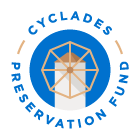The challenge
The Cycladic islands and their marine waters are unique ecosystems that require special support in order to sustain and protect them. However, economic development, population growth, overfishing, uncontrolled construction, pollution and climate change significantly increase risks for marine and coastal habitats, assets and ecosystems.
The solution
Cycladorama aims to support fish stock and marine ecosystem regeneration by inspiring fishermen in the Cyclades to envision a revived marine ecosystem, through community initiatives led by the fishers themselves, while pursuing to provide networking and collaboration opportunities for fishing associations to share good practices and challenges.
In order to achieve this, we map fishermen communities that have identified the problem of reduced fishing stock and wish to act on it, and organise engagement actions, such as frequent meetings and workshops for them, with regards to sustainable fishing, sustainable fishing tourism etc. With these gatherings we empower fishermen to follow models of sustainable, low-impact fishing, aiming both at the protection of the sea and their professional wellbeing. We incite them to share experiences, and exchange practical ideas and solutions.
Cycladorama is inspired by Amorgorama. Our ultimate aim is to identify and engage at least one more fishermen community in the Cyclades in sustainable fishing by being inspired and following the lead and vision of Amorgos.
Major donor and strategic partner of this initiative is Blue Marine Foundation.
“Blue Marine works using a combination of top-down intervention to improve governance of our seas and bottom-up project delivery to help local communities who are at the front line of ocean conservation. Our key strategic interventions are i) securing marine protected areas to ensure the protection of at least 30% of the ocean by 2030, ii) developing models of sustainable fishing proving that low-impact fishing benefits marine life, local fishers and communities, iii) restoring marine habitats to revive and protect vulnerable and threatened species and to sequester carbon, iv) tackling unsustainable fishing by highlighting poor practice and developing solutions, and v) connecting people with the sea and enhancing ocean understanding across generations.”
Achievements
In the context of the program, we have produced and share the Guide for responsible fishing tourism (Οδηγός για τον υπεύθυνο αλιευτικό τουρισμό, διαθέσιμος στα ελληνικά εδώ), which presents practical directions and guidelines on how fishing tourism can be done in a responsible and sustainable way, capturing positive experiences and challenges. The guide is addressed mainly to fishermen and fishing associations and provides useful information and recommendations that combine current trends in tourism with key findings from seventy-five (75) interviews with fishermen active in fishing tourism throughout Greece. Eight Golden Sustainability Tips and simple, practical recommendations are also included.
